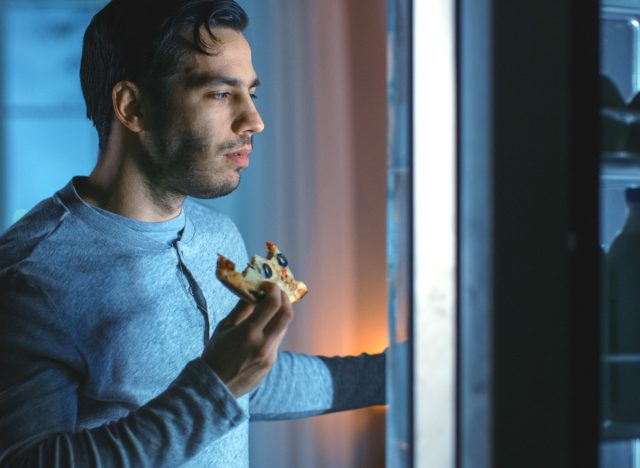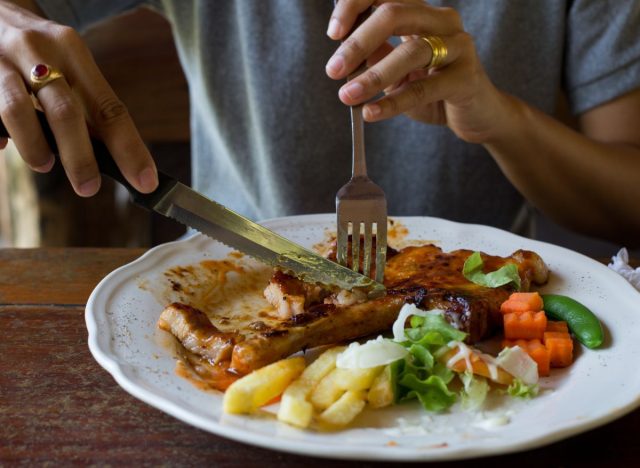What Happens to Your Body When You Eat After 7 p.m. Every Day

It’s such an amazing feeling when you can come home from work with plenty of time to throw together a delicious meal for yourself, your family, or your closest friends. Ensuring that you and your loved ones are full of yummy food when still early enough to wind down while binging a few episodes of your favorite show can make you feel accomplished. But while this scenario may represent ideal circumstances, the reality is that life doesn’t always work out that way. Sometimes you end up working late, or your evening schedule simply becomes too busy to have an early dinner ready on the table.
If you’ve made a habit of eating late-night dinners on a regular basis, you’ve probably wondered how or if this routine might impact your health. It’s been said that eating later in the evening can be “bad for you,” with the general consensus for what time is ideal to take your final bites for the day typically falling somewhere around 7:00 p.m.—but is that true?
We talked with a few dietitians to get to the bottom of what eating late at night does to your body. Surprisingly, their answers revealed both pros and cons! Read on to learn about what happens to your body when you eat after 7 p.m. every day—and for more helpful tips, check out 40 Best and Worst Foods To Eat Before Sleep.
You may have better blood glucose control.

According to Lauren Manaker, MS, RDN, LDN, CLEC, and author of The First Time Mom’s Pregnancy Cookbook and Fueling Male Fertility, eating a healthy snack in the evening hours can be helpful for people with certain health complications.
“For people with type 1 diabetes or a glycogen storage concern, eating a snack before bedtime may help people have better blood glucose control,” says Manaker.
You may gain abdominal fat.

While a nighttime snack or late dinner may be easier if you’ve had a busy day, some dietitians warn that it may lead to more weight gain around your abdominal area.
“To reduce belly fat, you may want to avoid nighttime snacking,” says Trista Best, MPH, RD, LD, and consultant for Balance One Supplements. “This is more than simply not going to the pantry or refrigerator in the evenings after dinner. I have found with a few clients that having them eat only when the sun is out has allowed them to experience weight loss, specifically the kind that hangs around the belly.”
You may be wondering why eating only during daylight can help with abdominal fat. Best believes this is due to two main components.
“For one, eating based on daylight cuts your eating window down from about 15 hours to just 12 hours,” she says. “Also, the foods that you typically consume after dark when you’re just feeling snacky are more calorie-dense and usually loaded with sugar or refined carbs, which tend to lead to belly fat specifically.”
Your acid reflux may feel worse.

Best also notes that eating late or right before bed can potentially make symptoms of GERD feel worse or more intense.
“Stomach acid can seem worse at night because you’ve been eating throughout the day, and your gut begins to slow down in digestion in the evening, and eating late in the evening can make this worse, regardless of the quality or quantity of the food you consume,” she says.
This also has to do with the fact that you’re less likely to engage in much movement at night.
“[You] are more likely to be sedentary or laying on your back, which can cause the acid in the gut to move up into the esophagus,” Best explains.
You may wake up in the middle of the night.

It can be frustrating to lay down for a restful night’s sleep only to wake up in the middle of your slumber and disrupt your REM cycle. Unfortunately, eating later at night might play a role in this annoyance.
“Data shows that people who eat closer to bed may be associated with nocturnal night waking, especially if it is within three hours of bedtime,” says Manaker.
With that in mind, eating before 7 p.m. can be helpful because it gives your body enough time to wind down and digest what you’ve consumed before hitting the hay.
You can restore muscle glycogen.

Although there are a handful of more negative side effects, eating later can have some benefits, too, especially if you like to workout toward the end of the day. According to Rachel Fine, RDN, intuitive eating counselor, and founder of To the Pointe Nutrition, eating later in the evening can be especially advantageous for your muscles, enabling their propensity for repair and endurance during intense exercise.
“Especially for those who exercise in the evening hours and for athletes, glycogen depletes rather quickly. So restoring your muscle glycogen levels with food will help to support energy for the next morning,” Fine says. “[Eating late in the evenings] can help to stimulate muscle protein synthesis as well, which supports muscle rebuilding and recovery,” she continues.









